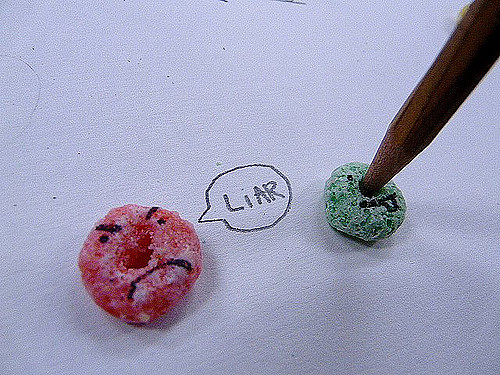
Image Credit: Thuy Pham
This business of negotiating is a tricky business indeed. No, we don’t always want to show up at the negotiating table and use our negotiation styles and negotiating techniques to lay all of our cards out in front of the other side. However, there appears to be a fine line when it comes to lying. Just exactly how far is too far? More importantly for you as a negotiator, how should you handle it if when you are negotiating with someone you start to realize that they are not being truthful with you?
People Who Lie About Bottom Lines And Any Alternatives
As a negotiator, you need to expect that what the other side says about their upper and lower limits are probably not 100% accurate. If you don’t want to end up being fooled by the other side then you are going to have to take the time prior to the negotiations and do some research on things that the other side has claimed in the past and what their reputation as negotiators is. Make sure that before the negotiations start, you explore all of the alternatives that you have to the deal that you are currently working on.
Beware Of Offers That Seem To Be “Too Good To Be True”
There’s nothing that makes a negotiator happier than when the other side presents them with an offer that exactly lines up with what they are trying to achieve. However, when this happens, you need to take a step back. You want to beware when you are presented with an offer that seems to be just a bit too good to be true. This can be especially true if you don’t know the other side of the table that well.
There are a lot of different ways that this could play out. If you accept a lowball price that the other side has offered to you, they may then proceed to attempt to include other deal terms that you would not normally agree to. If the other side is trying to set you up, often times they’ll lead things off by asking hypothetical questions such as “Would you purchase this product today for this amount?”. If they start to do this to you, your reaction should be to ask them for a concrete proposal and, as always, insist that you be allowed to read the fine print
The Escalation Of Commitment Problem
Negotiations take time, energy, and effort. The longer that we work at trying to reach a deal in a given negotiation, the more that we are going to find ourselves invested in the outcome. If we are able to agree to a deal with the other side, then the other side may be aware that you have invested a great deal of time in getting to this deal. They may also be aware that having reached this point, you might be less willing to walk away from it. Its at times like this that you need to keep in mind that everything that you’ve invested in getting to this deal is really a sunk cost and if the deal is a bad deal, we need to be willing to walk away from it.
Get As Well As You Give
One of the fundamental rules of negotiating is that if you make a concession to the other side, based on the norm of reciprocity, they are obligated to make a roughly equal concession to you. Where things can start to fall apart is if the other side fails to match a concession that you’ve made or they end up only paying lip service to the whole process of making offers and commitments. If you run into this situation, then you need to stop negotiating. Talk with the other side about what is going on. If it turns out that they are not willing to cooperate with you, then walk away.
Nibbling In The End
When the other side is not being completely honest with you, they will often wait until the negotiations are starting to wrap up before making a small request of you. You are excited because the end of the negotiations appears to be at hand and you are in the mood to just wrap things up as quickly as you can. The other side realizes this. They are using this unique time to “nibble” on you and attempt to get you to quickly agree to several things before the discussions are done. So what should you do when this happens? You need to reject their requests, no matter how small they are, unless they are willing to make a matching concession to you.
What All Of This Means For You
Honesty in principled negotiations is a tricky thing. No, you don’t want the other side of the table to know everything that you are thinking or planning. However, there is a flip side to this coin – there has to be a basic level of honesty and trust between both sides if you want to be able to get anything accomplished. There may be times in which the people that you are dealing with in a negotiation are not being honest with you. You need to know how best to handle these situations.
Before you start to negotiate with someone, take the time to do some research on them. You’ll want to find out about statements that they’ve made in the past and how other negotiators view them. You would also be well served by making sure that you know what your alternatives are. If an offer appears to be too good to be true, then in all honesty it probably is. No matter how much time and effort you have put into a negotiation, don’t allow the other side to turn it into a bad deal that you agree to just because of the effort that it took to create it. If you have been making concessions to the other side, then they had better be doing the same. If they aren’t, stop the negotiation and have a talk with them. If they refuse to do so, then walk away. Finally, as you reach the end of a negotiation, be on the lookout for attempts by the other side to try to get a last few items from you.
Honesty is a critical component of any negotiation. However, if they other side is not playing by the rules, then its going to be up to you to detect what is going on and take the appropriate action. Don’t allow the other side’s dishonesty to prevent you from getting the type of a deal that you want.
– Dr. Jim Anderson
Blue Elephant Consulting –
Your Source For Real World Negotiating Skills™
Question For You: What steps can you take in order to make the other side start to be more honest with you?
![]() Click here to get automatic updates when The Accidental Negotiator Blog is updated.
Click here to get automatic updates when The Accidental Negotiator Blog is updated.
P.S.: Free subscriptions to The Accidental Negotiator Newsletter are now available. Learn what you need to know to do the job. Subscribe now: Click Here!
What We’ll Be Talking About Next Time
Congratulations – you are a negotiator! This is an impressive accomplishment. However, now you are facing the question of what’s next? We would all like to become better negotiators and boost our negotiation styles and negotiating techniques; however, often we find ourselves unsure of how we can make this happen. The good news is that being a negotiator means that you’ve mastered a large set of skills. In order to become a better negotiator, you simply have to identify additional key skills and master those also. Let’s take a look at what you still have to learn.

